What are the most common behaviors of those who read the reviews?
To better understand the weight customers give to local business reviews and the role they play in deciding whether to choose a local business, it is important to consider how often they read them, on which platforms they do so, how much they trust them and other factors. When you as a business are competing to stand out and be chosen by a user, it's important to feel confident in your marketing and SEO strategies. Data around users who take the time to read reviews provides an in-depth understanding of consumer routines and can then be used by local businesses to make the right decisions about and strategy development in the local SEO piece.
As this is the first local business review survey, the results set a benchmark for measuring future trends in the habits of review readers. So see below what participants were asked and what they answered:
How often do you read reviews?
When assessing the weight that evaluations can have on a local business, it is important to assess public participation. So how often do people read reviews online?
The 96% of people reading reviews
Over half of consumers (56%) read reviews on a daily (23%) or weekly (33%) basis. Another 18% consult reviews monthly and 13% report reading them several times a year. Only 4% of consumers (those excluded from this part of our survey) never read reviews.
So what local businesses need to do is to acquire and maintain a set of reviews that is ready to satisfy the 96% of their (potential) customers who are looking to read reviews to decide which business to choose.
Which review platforms do you spend most of your time reading reviews on?
Knowing where customers spend most of their time helps create a strategy for where the business needs to allocate its resources. Obviously, weight should be given to the platform that the majority of users prefer.
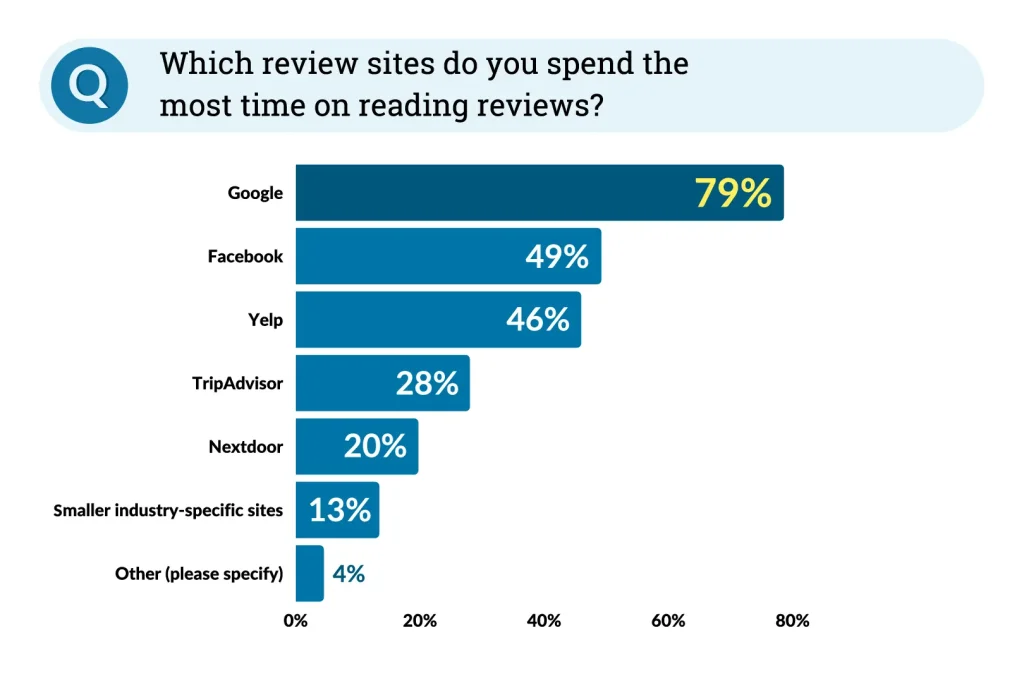
79% of consumers spend the most time reading Google-based reviews
It is not surprising that the 79% of consumers spend most of their time reading reviews based on the Google. Google's dominance as a search engine has given it a natural advantage as an already well-known source of reviews, allowing it to surpass even those platforms developed exclusively for the publication of consumer reviews.
As people look to multiple sites for reviews before choosing a business, our research found that Facebook comes in second with 49%, with Yelp coming in a close third with 46%. TripAdvisor performs well at 28%, as it is closely tied to the specific niche of travel and food, and don't overlook the growth of neighborhood platform Nextdoor, where 20% of consumers spend time reading reviews.
In Greece where Yelp and Nextdoor platforms are not developed, the third place is held by the platform of TripAdvisor.
Considering these numbers, it is obvious that local businesses should place primary emphasis on optimizing their Business Profiles on Google (Google My Business). Given the vital role that reviews play at different stages in the customer journey, businesses need to establish and maintain a presence on multiple platforms to avoid losing customers.
How much importance do you give to reviews when deciding whether to visit a local business?
It is vital to identify points in your customer's journey when searching for the right business where reviews play an important role in making them trust it enough to choose it.
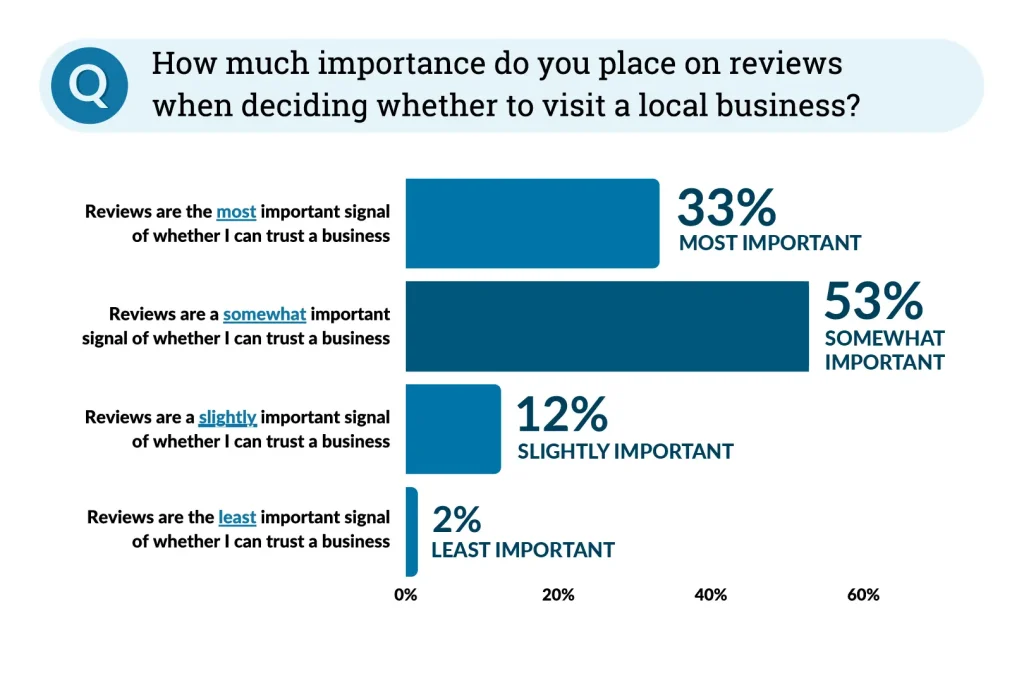
Trust the most important for 98% users
For 33% of respondents, reviews are the number one sign of whether they can trust a local business enough to choose it. Another 53% name reviews as somewhat important. Only 12% believe reviews are only somewhat important and only 2% call them the least important signal.
Overall, around 86% of consumers consider reviews to be either the most important or a somewhat important factor in determining whether a business deserves their trust. This significant number clearly shows us the public's perception of the reviews a business receives, highlighting the need to provide excellent customer service and ongoing commitment to online review management.
When deciding between local businesses, which part of a review matters most?
It's good to know exactly what elements of a review help you stand out more than your competitors.
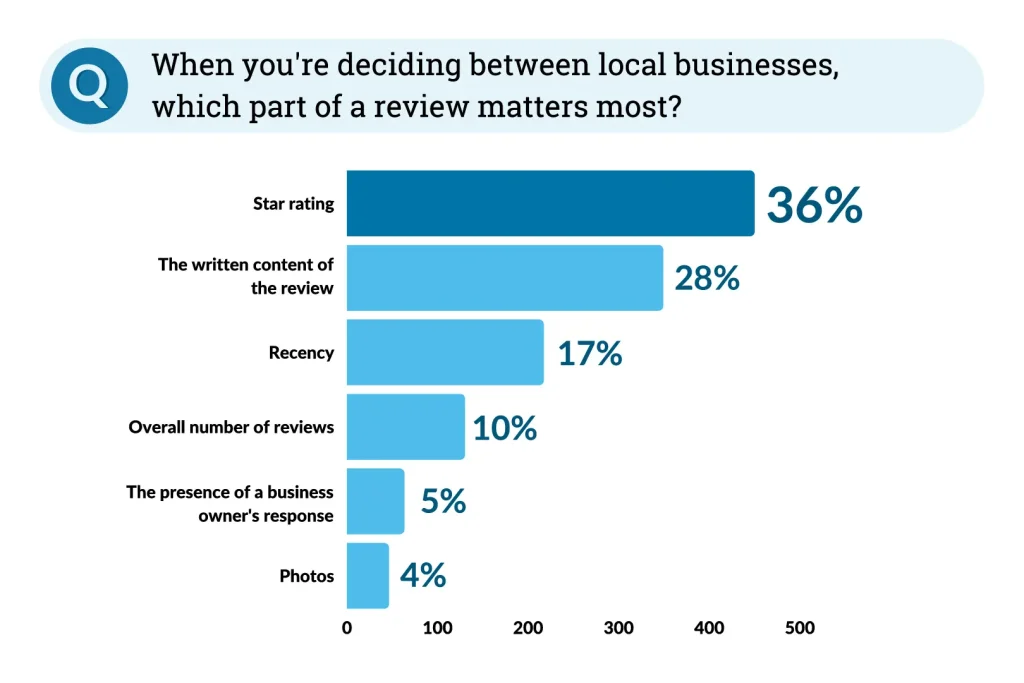
Star ratings are the key differentiator between local competitors
When choosing between several local businesses, 36% of consumers report average star rating as the part of the critics that matters most. This makes sense since the rating stars can at a glance reflect the overall rating of the business. Among others:
- 28% turns to the written content of the reviews
- 17% considers recent reviews as the leading factor
- 10% gives primary importance to the total number of reviews
- Only 4% of consumers take photos into account first and foremost
Surprisingly, only 5% selected the presence of owner responses as a top trust factor, and what we asked is whether it is the rarity of business responses or their low quality that is not prompting them to pay attention to it. The responses we received did indeed confirm this for us. It's not that they don't pay as much attention to them, but they don't look at them because most businesses don't. So businesses that want to stand out among a multitude of local businesses should invest seriously in the quality of the experiences of customers who leave reviews and take the time to provide them with personalised and individualised answers.
Imagine if they leave you a 5 line review with 5 pictures and you respond with a dry "Thank you very much. We hope to see you again." And even doing EXACTLY the same to all the other customers who left a review. Without any mention of their name, without paying any attention to the content of the review and essentially giving your customer and the thousands of potential customers who will read your responses the feeling that you are doing a chore.
What is the minimum score a business must have to be selected?
Star ratings equate to your reputation and you need to meet the expectations of users who are looking for a business like yours, so that you catch their attention at first glance.
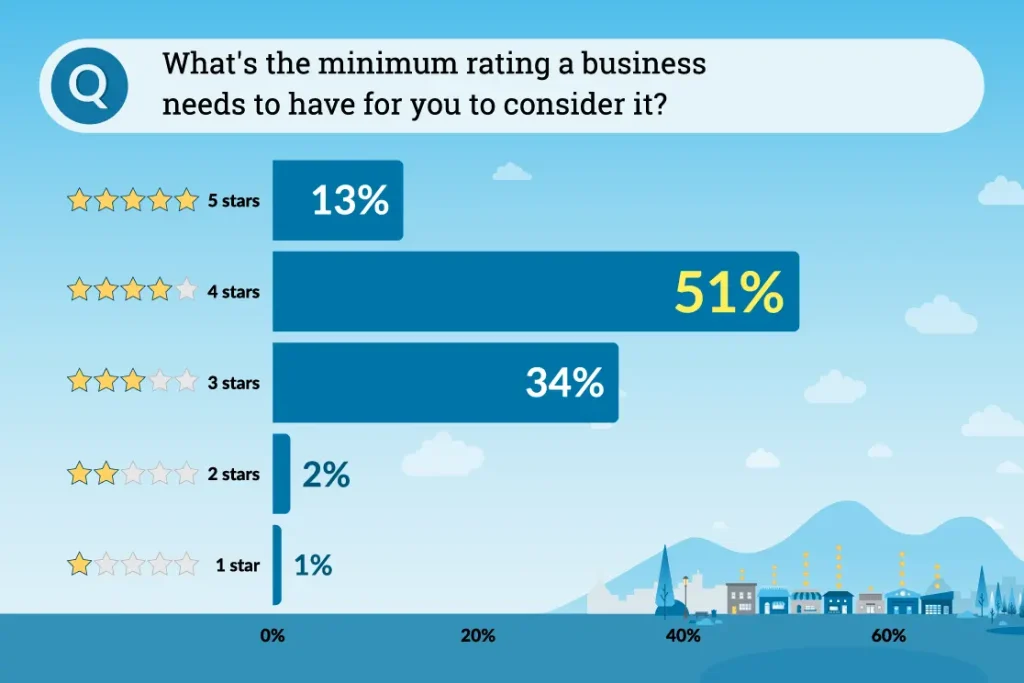
6 out of 10 consumers require 4+ stars to consider choosing a business
For more than half of respondents (51%), a 4-star rating is the minimum they will accept to consider whether to choose a local business. Only 13% require a perfect overall 5-star rating.
If your business is struggling with your average review score, you can draw strength from the realization that 34% of buyers may only choose you with a 3-star rating, hoping that you will be given the opportunity to prove that you really do provide high quality services and/or products, so that the ratings will start to go up over time. This is why every local business should very seriously consider increases the positive reviews of the. However, brands with an overall rating of 2 stars or less will only be considered by around 2% of consumers, signalling that reputation issues pose a significant risk to company viability.
All businesses can take comfort in knowing how few customers expect perfection, as 85% of people are willing to consider doing business with a neighborhood with a rating ranging from 3 to 4 stars. However, don't take this as a license to ignore complaints. Reputation can deteriorate quickly and should be protected for a positive, upward trend in incoming sentiment.
With the majority of users demanding an average score of more than 4, the increase in positive reviews of a business seems to be a one-way street.
Which of these review filtering actions do you do most often?
It is important to know that customers may not read your reviews in the default order in which they appear on your profiles.
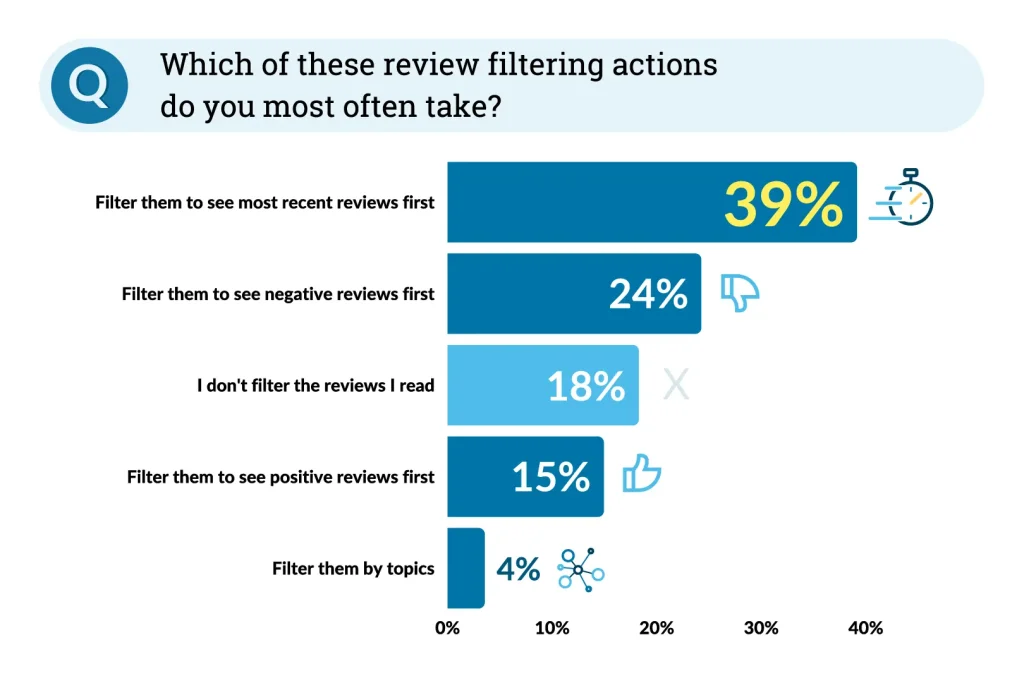
The most recent and the most negative are the reviews read first
Only 18% of modern review readers do not filter the review content they read. On the other hand, 39% filters reviews to see the most recent reviews first and 24% filters negative reviews first. Of the remaining respondents, 15% filters to see positive reviews first, while 4% has filtered based on the topic of the review.
The key element here is that consumers will judge a business based on the most recent reviews. So it makes sense to have a strategy for constantly acquiring new reviews that drives fresh user-generated content.
How many positive reviews do you usually read before deciding that a business is worth choosing?
It is good to know how many reviews potential customers need to read before they choose you.
70% of customers read 5-20 positive reviews before deciding that it is worth choosing a business
Today's customers take the time to read a significant amount of review content to inform themselves about whether a business is worth their time. An amazing 20% will read more than 20 reviews, a 37% will read 10-20 reviews and a 33% will read at least 5-9 reviews. Only the 11% read just 1-4 reviews to make a decision.
These figures speak to the volume of reviews a business should aim to have. Combined with our findings on filtering reviews, businesses need a significant number of positive, recent reviews to have a good chance of being chosen by potential customers.
What do you trust most?
If one source of reviews has the most credibility in the eyes of your customers, then that is the source that should have the most attention.
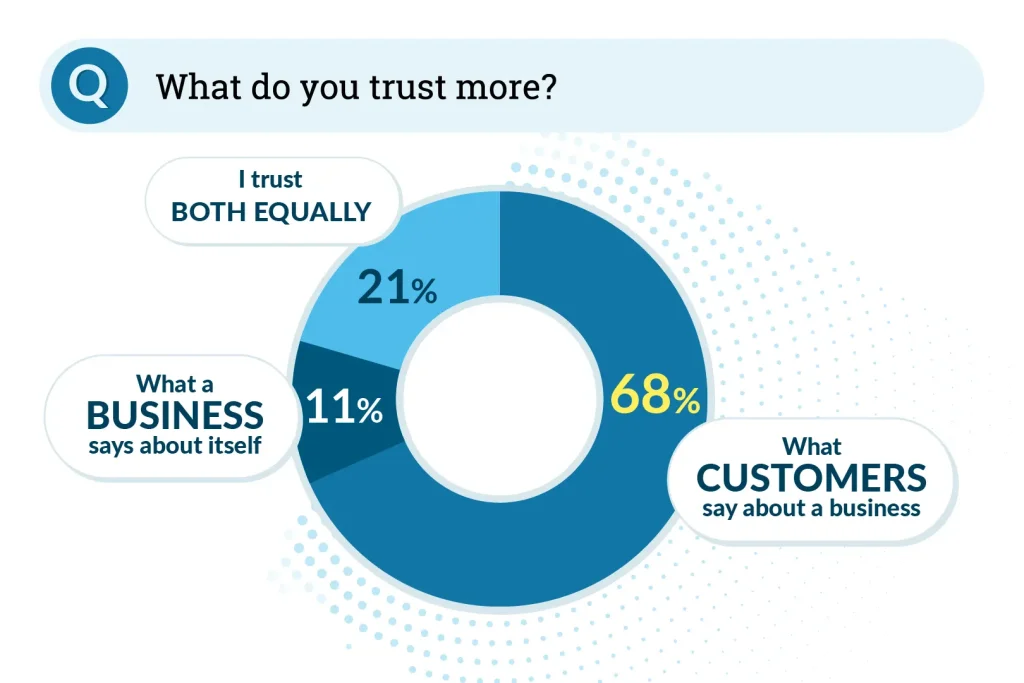
Only 11% of consumers trust what a business says about itself, compared to what others say about it
When asked which types of reviews they trust most, respondents overwhelmingly 68% said they trust what customers say about a local business more than what the business says about itself. Just 11% rely more on what the business says than public opinion in its reviews. A 20% trusts both sources equally.
The time has long since come when brands need to make an immediate transition from a reality they experienced in the past, where they largely controlled the public's perception of their business, to the new era where the customer is the one who controls the credibility and quality of the business. Reputation must be based on customer service and must be monitored and evaluated in the context of reviews.
It is now the customer who controls and decides the reliability and quality of local businesses
What makes you lose confidence in a business's reviews?
We learned what can make users lose trust in the public online reviews of a business.
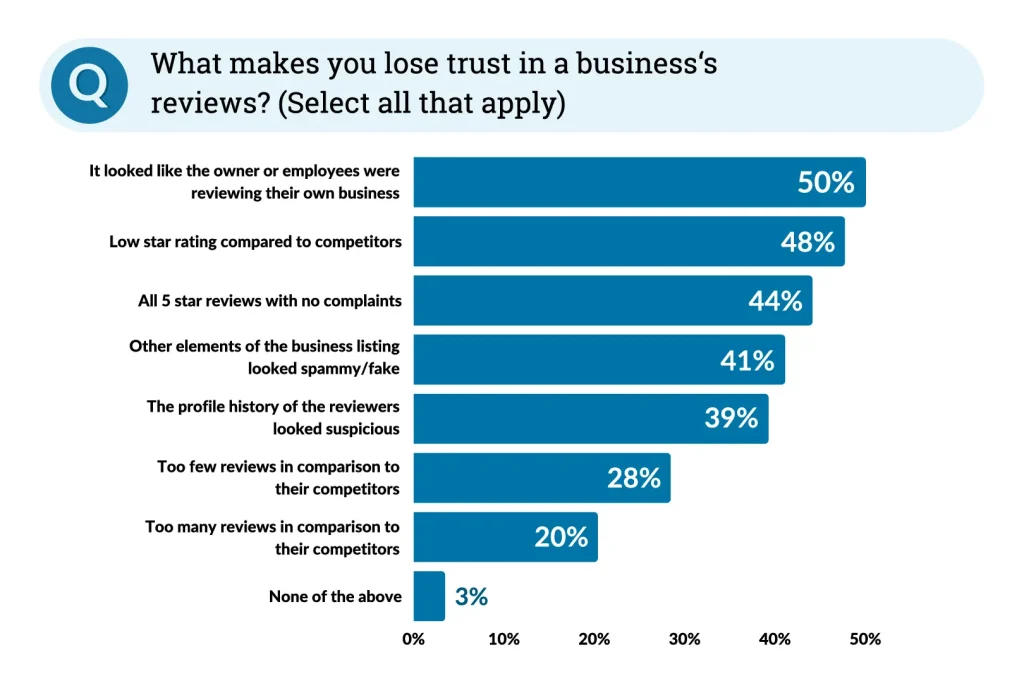
Even an indication that they have collected massive reviews
The 50% loses trust if it appears that owners or employees rate their own business, the 44% is distrustful when it sees a business with only five-star reviews and no complaints, the 41% will not choose a business if other local business information in Google My Business seems unreliable (inconsistencies in phone, hours or address compared to other business listings online), 39% is negative when the profiles of people leaving reviews look suspicious, and 20% is skeptical when a business has too many reviews compared to competitors.
Meanwhile, benchmarking based on competitors needs a lot of attention. 48% told us they would not choose a business with a low average star rating compared to its competitors, while 28% did not trust a business with very few reviews compared to competitors. Both are capable of deterring a user from choosing a business.
What you should keep in mind here is that it is never worth it to try to take the shortcut to success. Even reading something like this seems like an oxymoron. Reputation = business gold, and it must be earned, in part, through hard work to provide excellent customer service. What's the point of trying to fool someone about high quality service when you are unable to provide it? You will only do harm to your business as you will soon be inundated with negative reviews. Comply with Google's content guidelines and steadily build a genuine reputation for your brand that you can be proud of and users can trust.
How much do you trust local business reviews?
It is important to know whether online trust in reviews has been trending up or down in recent years.
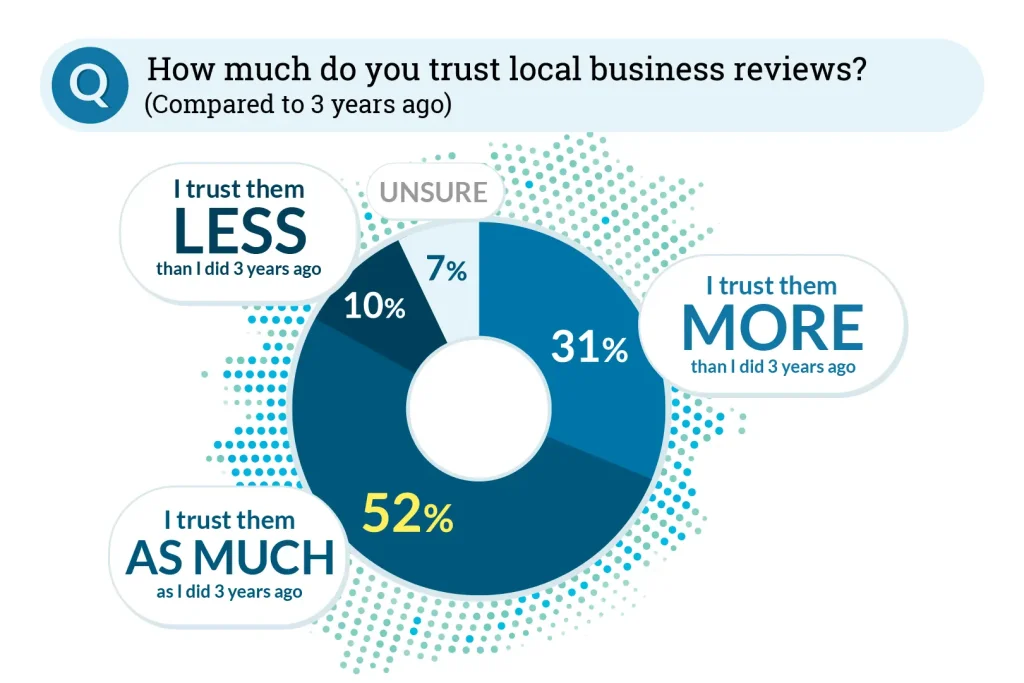
83% of consumers trust reviews as much or more than 3 years ago
While some polls suggest a growing awareness of the widespread problem of deceptive reviews, only 10% of our survey team trust reviews less than 3 years ago. A 52% trusts reviews as much as 3 years ago and a 31% trusts them more. The remaining 7% were not sure whether or not their trust in reviews had changed in this time period.
These statistics may shed light on the perspective of those who continue to ignore the weight of the critics. Perhaps because it is easier to ignore them than to manage them effectively. However, our data shows that the majority of the public (83%) continues to have considerable confidence in the validity of reviews. This is good news for most local businesses, as it is up to them to stand out in a fully competitive business environment.
When those who trusted reviews less in recent years were asked to explain what had happened to lose their trust, they cited the following factors:
- 56% is more aware of false reviews due to news monitoring or personal experience that has affected trust.
- 20% does not trust reviews because they do not believe that the values of those writing the reviews are aligned with their own, especially if they are very negative, leading them to believe that they do not represent them.
- 11% has lost trust during COVID, which he says changed people's expectations, leading to more negative reviews which they then trust less.
Meanwhile, those who trust our reviews the most gave us the following data:
- 21% of people reported that they trusted reviews more because they came from real people and offered concrete information. As more people are online, especially during COVID, respondents feel that more "real" people online are leaving reviews - not just "professional reviewers" whom some as mentioned perceive to have different values than themselves.
- 4% reported that being aware of fake reviews/fake reviews allowed them to better decipher real reviews from fake reviews.
- 6% believes that platforms fight against fake reviews.
- 10% was trusted more by the reviews because of the higher volume of reviews on the internet in general.
After reading enough positive reviews to choose a business, what do you do most often next?
Get to know your customer's journey by knowing where they are going after reading the reviews.
The 91% of the customer journey after reading the reviews remains in their direct control
When asked to explain the next action they will take after reading enough positive reviews to choose a business, 51% consumers are directed to the business's website. This is great news, since on your website you have complete control and can shape 100% the user experience with a stylish and easy to use website. The next most common action is to go directly to visiting the physical location of the business (27%), followed by contacting the business (13%) and looking at the business's social media profiles (8%).
So what becomes clear here is a fascinating dynamic that local businesses have in which the customer journey goes from a vast landscape that is only partially controlled by the business (reviews about the business) to one in which a surprising 91% of the environment is directly controlled by the business (the website, contact options and store visits). Only 8% transitions from partially controlled reviews to partially controlled social media. It's great news for local business owners as they retain more control over the quality of the customer experience.
Apart from visiting review sites, what else do you do to understand a business's reputation?
It's smart to diversify your reputation strategy so that customers have an impeccable image of you wherever they encounter your brand.
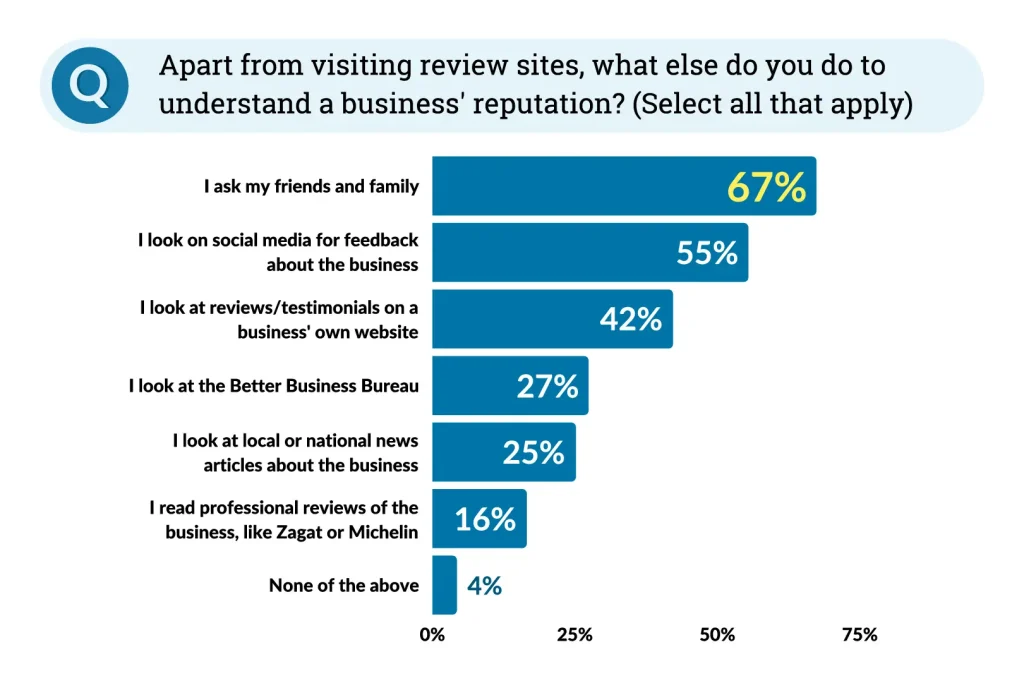
Word of mouth is the top alternative in customer reviews
When asked to list all the resources respondents use to assess the reputation of local businesses, in addition to the standard rating platforms, a plethora of alternatives emerge. Word-of-mouth advice from family and friends is something 67% does. This figure clearly highlights how brands should strive to speak positively about it wherever it is done. As 55% turns to social media for local business suggestions, it is clear the new habits that have been created around sharing information online. Local brands need to listen to all these changes and adapt.
It is encouraging that 42% of consumers will look at reviews and testimonials on a business's website and this number is a pretty strong incentive to incorporate these reviews into business websites. A 16% values professional reviews from organisations such as Zagat and Michelin, which is notable for local businesses in specific locations.
Second finding: The habits of those who write reviews.
Source: Moz



